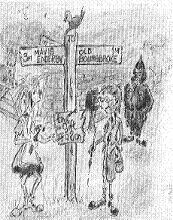

After day one of the Oval Test I’m looking forward to being forced to eat my words about Pietersen.
Time for a metaphor: the bitter bread of repentance is sweet when soaked in the honey of success.
It was correct to go with five bowlers, because that is effectively a team of four quicks. Panesar can only be used at the right time or when conditions help him, and for all his qualities, he would be the one to drop if an extra batsman were considered necessary.
What Pietersen rightly did was to tell his five batsmen that, if they did their job right, they were enough, especially when Flintoff, Ambrose and Broad were to follow.
Well, it was a good first day, marred only by Strauss’s early departure. The captain was everywhere, consulting, encouraging and cajoling. He used Panesar judiciously, and effectively. Harmison repaid the trust he’d been shown, Anderson maintained his new-found maturity and Flintoff was Flintoff.
* * *
The Today Programme had a numerologist on this morning. It is the silly season after all. The reason was all this nonsense about the Chinese superstition about the number eight.
Apparently, if you convert the letters of ‘China’ to numbers, you end up with the total ‘8’. Wow! What ‘The People’s Republic of China’ adds up to was not made clear.
What did interest me was the admission that this year is the eighth of the century. So we did celebrate the new millennium a year early after all.
* * *
I saw The Dark Knight, the new Batman film, the other day. Disappointing, I’m afraid, and not the ‘thunderbolt [that would] rip into the blanket of bland we call summer movies’, as Rolling Stone promised.
It was good fun but too long. The action sequences were brilliant but so many and so protracted that they lost their power to thrill.
The reviewers have been impressed by the film’s insertion of a bit of moral philosophising, but it’s all a bit old hat. The dark side of heroism, the linking of hero and villain, the cruelty of fate which can push a good man onto the dark side, the moral choice imposed on ordinary people.
These things were a staple of the Western fifty years ago. Bend of the River, for example, where James Stewart and Arthur Kennedy are two sides of the same coin; High Noon, where the townspeople make the wrong choice, and At Gunpoint where they make the right one; Red River, The Searchers, Lawman, where the heroic lead moves further and deeper into psychosis.
In those films, the moral choices faced are essential to the plot, not tacked to help an action fantasy appeal to would-be intellectuals.
Time for a metaphor: the bitter bread of repentance is sweet when soaked in the honey of success.
It was correct to go with five bowlers, because that is effectively a team of four quicks. Panesar can only be used at the right time or when conditions help him, and for all his qualities, he would be the one to drop if an extra batsman were considered necessary.
What Pietersen rightly did was to tell his five batsmen that, if they did their job right, they were enough, especially when Flintoff, Ambrose and Broad were to follow.
Well, it was a good first day, marred only by Strauss’s early departure. The captain was everywhere, consulting, encouraging and cajoling. He used Panesar judiciously, and effectively. Harmison repaid the trust he’d been shown, Anderson maintained his new-found maturity and Flintoff was Flintoff.
* * *
The Today Programme had a numerologist on this morning. It is the silly season after all. The reason was all this nonsense about the Chinese superstition about the number eight.
Apparently, if you convert the letters of ‘China’ to numbers, you end up with the total ‘8’. Wow! What ‘The People’s Republic of China’ adds up to was not made clear.
What did interest me was the admission that this year is the eighth of the century. So we did celebrate the new millennium a year early after all.
* * *
I saw The Dark Knight, the new Batman film, the other day. Disappointing, I’m afraid, and not the ‘thunderbolt [that would] rip into the blanket of bland we call summer movies’, as Rolling Stone promised.
It was good fun but too long. The action sequences were brilliant but so many and so protracted that they lost their power to thrill.
The reviewers have been impressed by the film’s insertion of a bit of moral philosophising, but it’s all a bit old hat. The dark side of heroism, the linking of hero and villain, the cruelty of fate which can push a good man onto the dark side, the moral choice imposed on ordinary people.
These things were a staple of the Western fifty years ago. Bend of the River, for example, where James Stewart and Arthur Kennedy are two sides of the same coin; High Noon, where the townspeople make the wrong choice, and At Gunpoint where they make the right one; Red River, The Searchers, Lawman, where the heroic lead moves further and deeper into psychosis.
In those films, the moral choices faced are essential to the plot, not tacked to help an action fantasy appeal to would-be intellectuals.
Here's a review that says it better than I can:

No comments:
Post a Comment